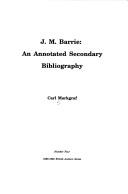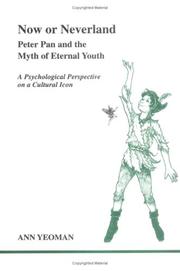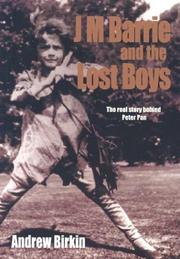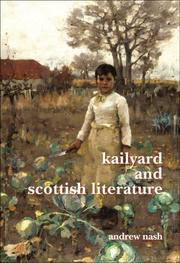| Listing 1 - 6 of 6 |
Sort by
|

ISBN: 0944318037 0944318673 Year: 1989 Publisher: Greensboro, NC : ELT Press,
Abstract | Keywords | Export | Availability | Bookmark
 Loading...
Loading...Choose an application
- Reference Manager
- EndNote
- RefWorks (Direct export to RefWorks)
Barrie, J. M. --- Bibliography. --- Barrie, James Matthew, --- Barri, Dzheĭms, --- Bari, G'ems, --- Bêrī, Jemsa, --- Барри, Джеймс, --- ברי, ג׳יימס --- גפן, סיגל --- J. M. バリ,
Book
ISBN: 1282916939 9786612916939 9042032197 9789042032194 9781282916937 9789042032187 6612916931 9042032189 Year: 2010 Publisher: Amsterdam [etc.] Rodopi
Abstract | Keywords | Export | Availability | Bookmark
 Loading...
Loading...Choose an application
- Reference Manager
- EndNote
- RefWorks (Direct export to RefWorks)
J.M. Barrie’s critical reputation is unusually problematic. Originally viewed as a genius to rank with Shaw and Wilde, Barrie soon fell victim to damaging psychological theories about his life and his patriotism. The few critics who have commented on Barrie have colluded with dominant myths about a figure who, like his most famous creation, never grew up, who abandoned Scotland and made light of his own people when serious social analyses of the nation’s condition were called for, and who scorned the opportunities of University learning when at Edinburgh. Myths and the Mythmaker attempts to challenge these myths and offer a just revaluation of Barrie’s genius. Through closely focused textual analyses, it dispels the popular images of Barrie as “escapist” writer and immature, mother-fixated artist. It seeks to replace the narrow prose canon on which the “Oedipal” and “Kailyard” myths are based with a thorough account of his Victorian apprenticeship. New research into Barrie’s early work and criticism show the enduring influence of his Edinburgh education on his creative writing, his academic articles, and his own complex views on artistic genius.
Barrie, J. M. --- Barrie, James Matthew, --- Barri, Dzheĭms, --- Bari, G'ems, --- Bêrī, Jemsa, --- Барри, Джеймс, --- ברי, ג׳יימס --- גפן, סיגל --- J. M. バリ, --- Criticism and interpretation. --- English literature --- Scottish authors --- History and criticism.
Book
ISBN: 0779980522 9780779980529 9781495504730 1495504735 Year: 2016 Publisher: Lewiston, New York, USA
Abstract | Keywords | Export | Availability | Bookmark
 Loading...
Loading...Choose an application
- Reference Manager
- EndNote
- RefWorks (Direct export to RefWorks)
Barrie, J. M. --- Peter Pan --- Film adaptations. --- Adaptations cinématographiques. --- Peter Pan (Barrie, J. M.) --- Bari, G'ems, --- Barri, Dzheĭms, --- Barrie, James Matthew, --- Bêrī, Jemsa, --- Барри, Джеймс, --- ברי, ג׳יימס --- גפן, סיגל --- J. M. バリ, --- Piṭer-Pen (Barrie, J. M.)

ISBN: 058509716X 9780585097169 091912383X 9780919123830 091912383X Year: 1998 Publisher: Toronto Inner City Books
Abstract | Keywords | Export | Availability | Bookmark
 Loading...
Loading...Choose an application
- Reference Manager
- EndNote
- RefWorks (Direct export to RefWorks)
Psychological fiction, English --- Psychoanalysis and literature --- Youth in literature --- Boys in literature --- Myth in literature --- English --- Languages & Literatures --- English Literature --- Literature and psychoanalysis --- Psychoanalytic literary criticism --- Literature --- History and criticism --- Psychological study of literature --- psychologie --- jeugdliteratuur --- Barrie, James Matthew --- Barrie, J.M. --- Barrie, J. M. --- Peter Pan --- Knowledge --- Psychology. --- Pan, Peter --- Piotrús Pan --- Barrie, James Matthew, --- Barri, Dzheĭms, --- Bari, G'ems, --- Bêrī, Jemsa, --- Барри, Джеймс, --- ברי, ג׳יימס --- גפן, סיגל --- J. M. バリ, --- Psychoanalysis and literature. --- Youth in literature. --- Boys in literature. --- Myth in literature. --- History and criticism.

ISBN: 9780300211320 0300211325 0300098227 9780300098228 Year: 2003 Publisher: New Haven
Abstract | Keywords | Export | Availability | Bookmark
 Loading...
Loading...Choose an application
- Reference Manager
- EndNote
- RefWorks (Direct export to RefWorks)
Authors, Scottish --- Father figures --- Adopted children --- Orphans --- Boys --- Children --- Males --- Young men --- Orphans and orphan-asylums --- Adopted infants --- Children, Adopted --- Figures, Father --- Psychology --- Barrie, J. M. --- Llewelyn Davies, Nicholas, --- Llewelyn Davies, Peter, --- Llewelyn Davies, John, --- Peter Pan --- Pan, Peter --- Piotrús Pan --- Davies, John Llewelyn, --- Llewelyn Davies, Jack, --- Davies, Peter Llewelyn, --- Davies, Peter, --- Davies, Nicholas Llewelyn, --- Llewelyn Davies, Nico, --- Barrie, James Matthew, --- Barri, Dzheĭms, --- Bari, G'ems, --- Bêrī, Jemsa, --- Барри, Джеймс, --- ברי, ג׳יימס --- גפן, סיגל --- J. M. バリ, --- Family. --- Orphaned children

ISBN: 9789042022034 9781435600720 143560072X 9789401204415 9401204411 9042022035 9042022035 Year: 2007 Publisher: Amsterdam [etc.] Rodopi
Abstract | Keywords | Export | Availability | Bookmark
 Loading...
Loading...Choose an application
- Reference Manager
- EndNote
- RefWorks (Direct export to RefWorks)
For more than a century, the word 'Kailyard' has been a focal point of Scottish literary and cultural debate. Originally a term of literary criticism, it has come to be used, often pejoratively, across a whole range of academic and popular discourse. Historians, politicians and critics of Scottish film and media have joined literary scholars in using the term to set out a diagnosis of Scottish culture. This is the first comprehensive study of the subject. Andrew Nash traces the origins of the Kailyard diagnosis in the nineteenth century and considers the critical concerns that gave rise to it. He then provides a full reassessment of the literature most commonly associated with the term – the fiction of J.M. Barrie, S.R. Crockett and Ian Maclaren. Placing this work in more appropriate contexts, he considers the literary, social and religious imperatives that underpinned it and discusses the impact of these writers in the publishing world. These chapters are succeeded by detailed analysis of the various ways in which the term has been used in wider discussions of Scottish literature and culture. Discussing literary criticism, film studies, and political and sociological analyses of Scotland, Nash shows how Kailyard, as a critical term, helps expose some of the key issues in Scottish cultural debate in the twentieth century, including discussions over national representation, popular culture and the parochialism of Scottish culture.
English literature --- Popular culture --- Literature and society --- English literature. --- Literature and society. --- Popular culture. --- Literature --- Literature and sociology --- Society and literature --- Sociology and literature --- Sociolinguistics --- Culture, Popular --- Mass culture --- Pop culture --- Popular arts --- Communication --- Intellectual life --- Mass society --- Recreation --- Culture --- British literature --- Inklings (Group of writers) --- Nonsense Club (Group of writers) --- Order of the Fancy (Group of writers) --- Scottish authors --- History and criticism. --- Scottish authors. --- Social aspects --- Barrie, J. M. --- Crockett, S. R. --- Maclaren, Ian, --- Barrie, James Matthew, --- Barri, Dzheĭms, --- Bari, G'ems, --- Bêrī, Jemsa, --- Барри, Джеймс, --- ברי, ג׳יימס --- גפן, סיגל --- J. M. バリ, --- Watson, John, --- Crockett, Samuel Rutherford, --- Criticism and interpretation. --- 1800-1899 --- Scotland. --- Caledonia --- Ecosse --- Schotland --- Scotia --- Škotska --- Sŭkʻotʻŭlland --- Great Britain
| Listing 1 - 6 of 6 |
Sort by
|

 Search
Search Feedback
Feedback About UniCat
About UniCat  Help
Help News
News